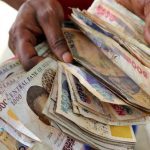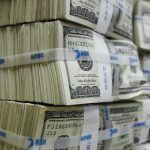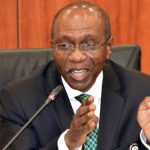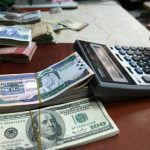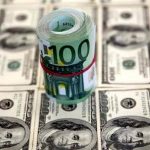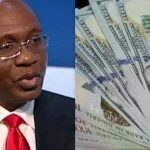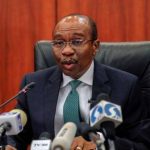Nigeria’s foreign exchange reserves is now $34.7 billion, according to data obtained from the Central Bank of Nigeria’s website.
This is an increase of $110 million from Saturday July 6th figure of $34.5 billion.
The reserves have shown consistent growth over the past week, with a total gain of $316 million since July 1.
The rise over the past week is due to several factors, including the recent rise in oil prices, improved diaspora remittances, and the Central Bank’s efforts to stabilize the currency.
Economic Experts view the increase in foreign exchange reserves as a positive development for Nigeria’s economy, providing a buffer against external shocks and supporting the country’s ability to meet its financial obligations.
The Fitch Ratings agency recently revised Nigeria’s economic outlook to positive, citing significant reforms that have restored macroeconomic stability and enhanced policy coherence and credibility.
The Central Bank has also implemented various measures to manage the foreign exchange market, including the introduction of the Investors’ and Exporters’ window.
The initiative has helped in attracting foreign investment and boost reserves, leading to higher inflows to the official foreign exchange market and a significant rise in foreign portfolio investment inflows.
Nigeria’s foreign exchange reserves is now $34.7 billion, according to data obtained from the Central Bank of Nigeria’s website.
This is an increase of $110 million from Saturday July 6th figure of $34.5 billion.
The reserves have shown consistent growth over the past week, with a total gain of $316 million since July 1.
The rise over the past week is due to several factors, including the recent rise in oil prices, improved diaspora remittances, and the Central Bank’s efforts to stabilize the currency.
Economic Experts view the increase in foreign exchange reserves as a positive development for Nigeria’s economy, providing a buffer against external shocks and supporting the country’s ability to meet its financial obligations.
The Fitch Ratings agency recently revised Nigeria’s economic outlook to positive, citing significant reforms that have restored macroeconomic stability and enhanced policy coherence and credibility.
The Central Bank has also implemented various measures to manage the foreign exchange market, including the introduction of the Investors’ and Exporters’ window.
The initiative has helped in attracting foreign investment and boost reserves, leading to higher inflows to the official foreign exchange market and a significant rise in foreign portfolio investment inflows.
Nigeria’s foreign exchange reserves is now $34.7 billion, according to data obtained from the Central Bank of Nigeria’s website.
This is an increase of $110 million from Saturday July 6th figure of $34.5 billion.
The reserves have shown consistent growth over the past week, with a total gain of $316 million since July 1.
The rise over the past week is due to several factors, including the recent rise in oil prices, improved diaspora remittances, and the Central Bank’s efforts to stabilize the currency.
Economic Experts view the increase in foreign exchange reserves as a positive development for Nigeria’s economy, providing a buffer against external shocks and supporting the country’s ability to meet its financial obligations.
The Fitch Ratings agency recently revised Nigeria’s economic outlook to positive, citing significant reforms that have restored macroeconomic stability and enhanced policy coherence and credibility.
The Central Bank has also implemented various measures to manage the foreign exchange market, including the introduction of the Investors’ and Exporters’ window.
The initiative has helped in attracting foreign investment and boost reserves, leading to higher inflows to the official foreign exchange market and a significant rise in foreign portfolio investment inflows.
Nigeria’s foreign exchange reserves is now $34.7 billion, according to data obtained from the Central Bank of Nigeria’s website.
This is an increase of $110 million from Saturday July 6th figure of $34.5 billion.
The reserves have shown consistent growth over the past week, with a total gain of $316 million since July 1.
The rise over the past week is due to several factors, including the recent rise in oil prices, improved diaspora remittances, and the Central Bank’s efforts to stabilize the currency.
Economic Experts view the increase in foreign exchange reserves as a positive development for Nigeria’s economy, providing a buffer against external shocks and supporting the country’s ability to meet its financial obligations.
The Fitch Ratings agency recently revised Nigeria’s economic outlook to positive, citing significant reforms that have restored macroeconomic stability and enhanced policy coherence and credibility.
The Central Bank has also implemented various measures to manage the foreign exchange market, including the introduction of the Investors’ and Exporters’ window.
The initiative has helped in attracting foreign investment and boost reserves, leading to higher inflows to the official foreign exchange market and a significant rise in foreign portfolio investment inflows.
Nigeria’s foreign exchange reserves is now $34.7 billion, according to data obtained from the Central Bank of Nigeria’s website.
This is an increase of $110 million from Saturday July 6th figure of $34.5 billion.
The reserves have shown consistent growth over the past week, with a total gain of $316 million since July 1.
The rise over the past week is due to several factors, including the recent rise in oil prices, improved diaspora remittances, and the Central Bank’s efforts to stabilize the currency.
Economic Experts view the increase in foreign exchange reserves as a positive development for Nigeria’s economy, providing a buffer against external shocks and supporting the country’s ability to meet its financial obligations.
The Fitch Ratings agency recently revised Nigeria’s economic outlook to positive, citing significant reforms that have restored macroeconomic stability and enhanced policy coherence and credibility.
The Central Bank has also implemented various measures to manage the foreign exchange market, including the introduction of the Investors’ and Exporters’ window.
The initiative has helped in attracting foreign investment and boost reserves, leading to higher inflows to the official foreign exchange market and a significant rise in foreign portfolio investment inflows.
Nigeria’s foreign exchange reserves is now $34.7 billion, according to data obtained from the Central Bank of Nigeria’s website.
This is an increase of $110 million from Saturday July 6th figure of $34.5 billion.
The reserves have shown consistent growth over the past week, with a total gain of $316 million since July 1.
The rise over the past week is due to several factors, including the recent rise in oil prices, improved diaspora remittances, and the Central Bank’s efforts to stabilize the currency.
Economic Experts view the increase in foreign exchange reserves as a positive development for Nigeria’s economy, providing a buffer against external shocks and supporting the country’s ability to meet its financial obligations.
The Fitch Ratings agency recently revised Nigeria’s economic outlook to positive, citing significant reforms that have restored macroeconomic stability and enhanced policy coherence and credibility.
The Central Bank has also implemented various measures to manage the foreign exchange market, including the introduction of the Investors’ and Exporters’ window.
The initiative has helped in attracting foreign investment and boost reserves, leading to higher inflows to the official foreign exchange market and a significant rise in foreign portfolio investment inflows.
Nigeria’s foreign exchange reserves is now $34.7 billion, according to data obtained from the Central Bank of Nigeria’s website.
This is an increase of $110 million from Saturday July 6th figure of $34.5 billion.
The reserves have shown consistent growth over the past week, with a total gain of $316 million since July 1.
The rise over the past week is due to several factors, including the recent rise in oil prices, improved diaspora remittances, and the Central Bank’s efforts to stabilize the currency.
Economic Experts view the increase in foreign exchange reserves as a positive development for Nigeria’s economy, providing a buffer against external shocks and supporting the country’s ability to meet its financial obligations.
The Fitch Ratings agency recently revised Nigeria’s economic outlook to positive, citing significant reforms that have restored macroeconomic stability and enhanced policy coherence and credibility.
The Central Bank has also implemented various measures to manage the foreign exchange market, including the introduction of the Investors’ and Exporters’ window.
The initiative has helped in attracting foreign investment and boost reserves, leading to higher inflows to the official foreign exchange market and a significant rise in foreign portfolio investment inflows.
Nigeria’s foreign exchange reserves is now $34.7 billion, according to data obtained from the Central Bank of Nigeria’s website.
This is an increase of $110 million from Saturday July 6th figure of $34.5 billion.
The reserves have shown consistent growth over the past week, with a total gain of $316 million since July 1.
The rise over the past week is due to several factors, including the recent rise in oil prices, improved diaspora remittances, and the Central Bank’s efforts to stabilize the currency.
Economic Experts view the increase in foreign exchange reserves as a positive development for Nigeria’s economy, providing a buffer against external shocks and supporting the country’s ability to meet its financial obligations.
The Fitch Ratings agency recently revised Nigeria’s economic outlook to positive, citing significant reforms that have restored macroeconomic stability and enhanced policy coherence and credibility.
The Central Bank has also implemented various measures to manage the foreign exchange market, including the introduction of the Investors’ and Exporters’ window.
The initiative has helped in attracting foreign investment and boost reserves, leading to higher inflows to the official foreign exchange market and a significant rise in foreign portfolio investment inflows.



